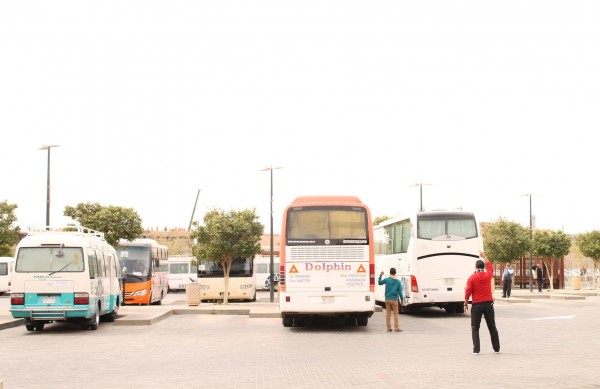By: Malak Sekaly and Dina Sabry
@MalakSekaly @DeenaSabry
![This initiative is a response to the recent complaints that the bus service is inadequate amid an increase in ticket prices [Suhayla Al Shaikh]](http://www.auccaravan.com/wp-content/uploads/2016/10/Raye7-fein-e1476641070337.jpg)
The Student Union (SU) recently announced their collaboration with the mobile carpooling app Raye7 (Going), which will allow members of the AUC community to carpool to and from the New Campus as an alternative to the university bus service.
The app will allow community members to choose a pick-up time with someone who lives close by and is headed in the same direction.
This initiative is a response to the recent complaints that the bus service is inadequate amid an increase in ticket prices.
The SU’s Political Representation Chairperson Mohamed Gadalla explained how there has been an increase in the number of students expressing their dissatisfaction with the overall quality of the bus service.
“Some people claim it’s the quality of the bus, others say it’s how the drivers deal with the students, others have problems with the schedule,” he told The Caravan.
Bus riders Passant Khamis and Noha El Sherif do not have a major problem with the overall quality of the buses but are unhappy about the current schedules and lack of sufficient time slots .
El Sherif says that there is a three-hour gap following the 4:15 pm bus, which becomes cumbersome for those who live a considerable distance from campus, such as in October 6 district.
To find an alternative, Gadalla said the SU looked for a carpooling initiative that would limit the number of cars on campus while still catering to the students’ needs for more flexible time slots.
He said that the SU was also requiring to have drivers from the AUC community itself so that no security issues arise.
“We are encouraging the idea of carpooling but we are not advertising Raye7,” said Gadalla.
“We are supporting the carpooling initiative in general. If people will be carpooling within themselves, we wouldn’t of course be against that. The idea of carpooling is very important.”
Regarding security issues of riding with strangers, Gadalla emphasized that the ride will be registered on both the driver and customer’s emails, which will make it easy to track riders.
“It’s very rare that someone within the AUC community would do something harmful towards someone else,” stated Gadalla.
He also added that the customer “can track the person with their name, so even if someone was harmed, they can report them and this person can be easily identified by the university.”
The app connects users with nearby colleagues and coworkers who are heading to the same destination at the same time. It is designed specifically for communities like businesses, corporations, and universities, and AUC is the first university to make use of the app.
Gadalla says the app creates an incentive for students to carpool: with each ride a person offers, points are added to their account. Once these points are accumulated to a certain value, they can then be exchanged for cash money.
Currently, EGP 0.55 is charged per kilometer and only cash payment is accepted; however, Gadalla says that Raye7 will implement online payment with the upcoming app update to make the process easier.
All monetary issues will be handled completely by Raye7, not the SU.
What sets Raye7 apart from other car services like Careem and Uber, is that it only caters to the AUC community — only those with AUC emails are eligible to sign-up. In addition, carpooling is only done to and from campus.
Gadalla also added that one of the main benefits of Raye7 is that it guarantees affordable prices for car rides by not having surges in prices, a problem found in Careem and Uber.
Earlier in 2014, then AUC President Lisa Anderson announced that the university will be suspending the operation of the bus services within the next four to five years. However, Gadalla said that this is not an excuse for the university to ignore the pressing problem of the service.
“Even if they do cancel it, they should not be reluctant about the service. People pay a lot of money for the service and they do not direct it wisely or efficiently. That’s a problem within the transportation committee that should be solved,” Gadalla explained.
“The university’s main mandate is to provide the students with buses that are up to the standards in terms of quality and that are not expensive,” added Gadalla.
He strongly believes that the university should respond to such an initiative, especially with the possibility of the application replacing the bus service in the long run.
